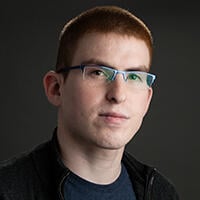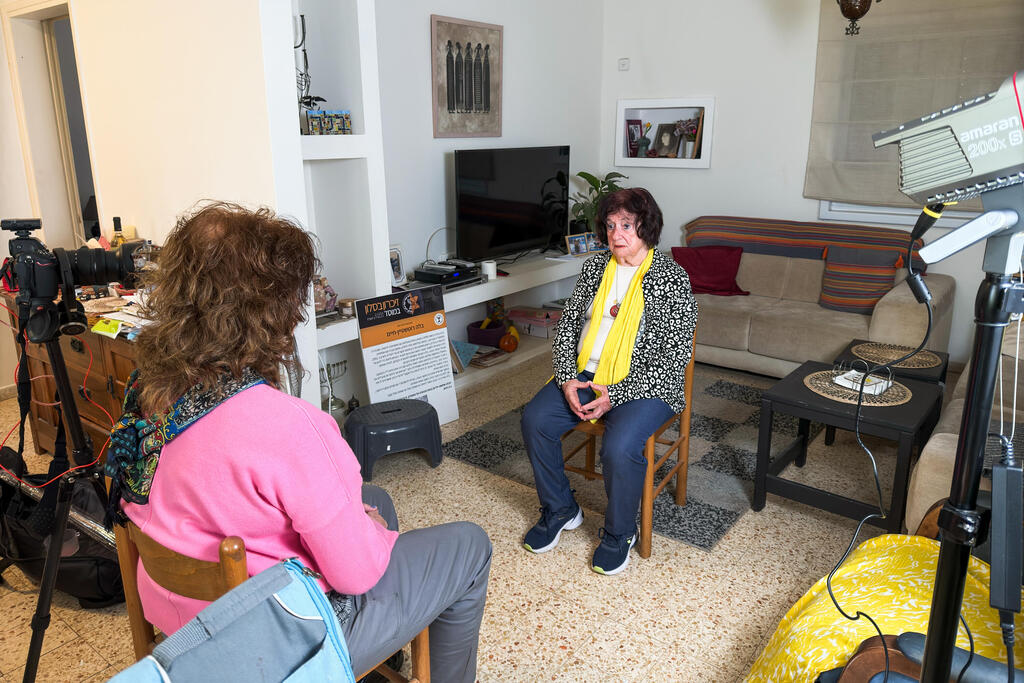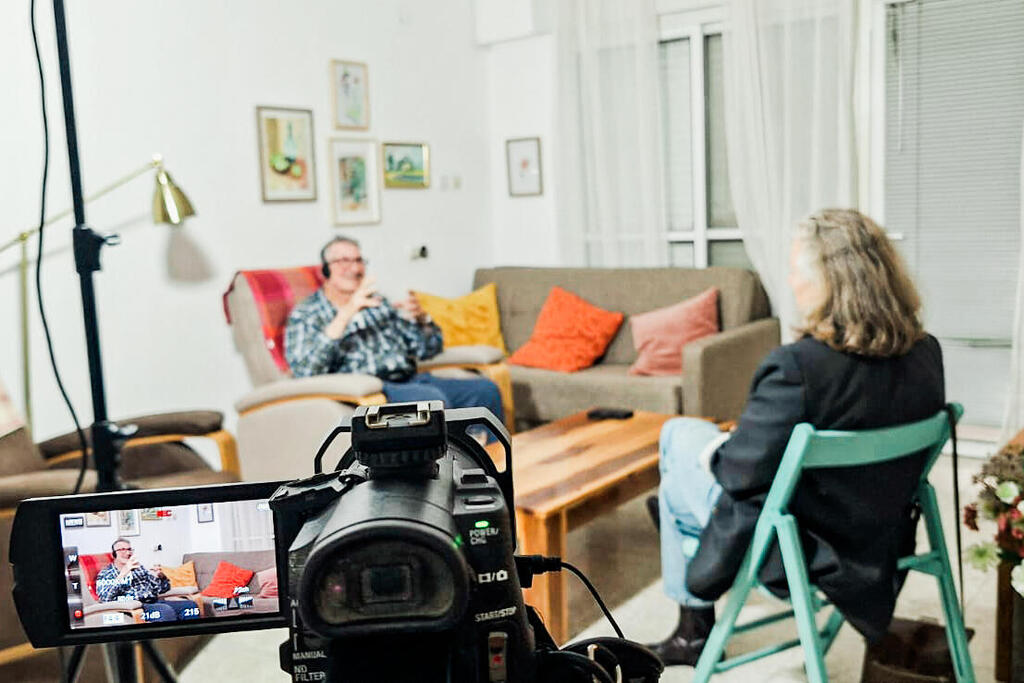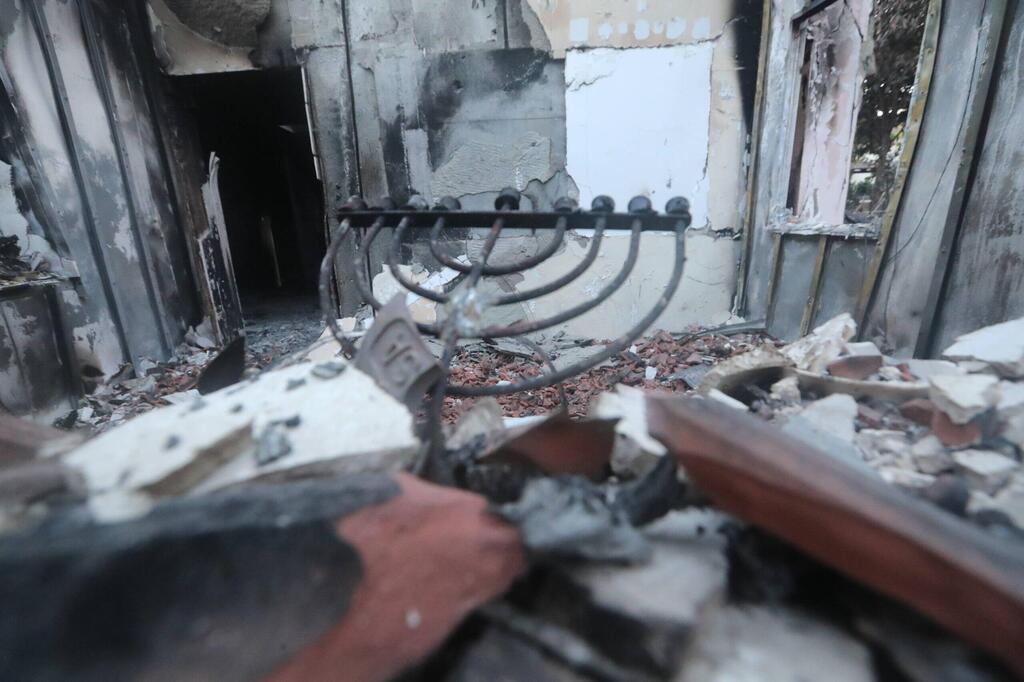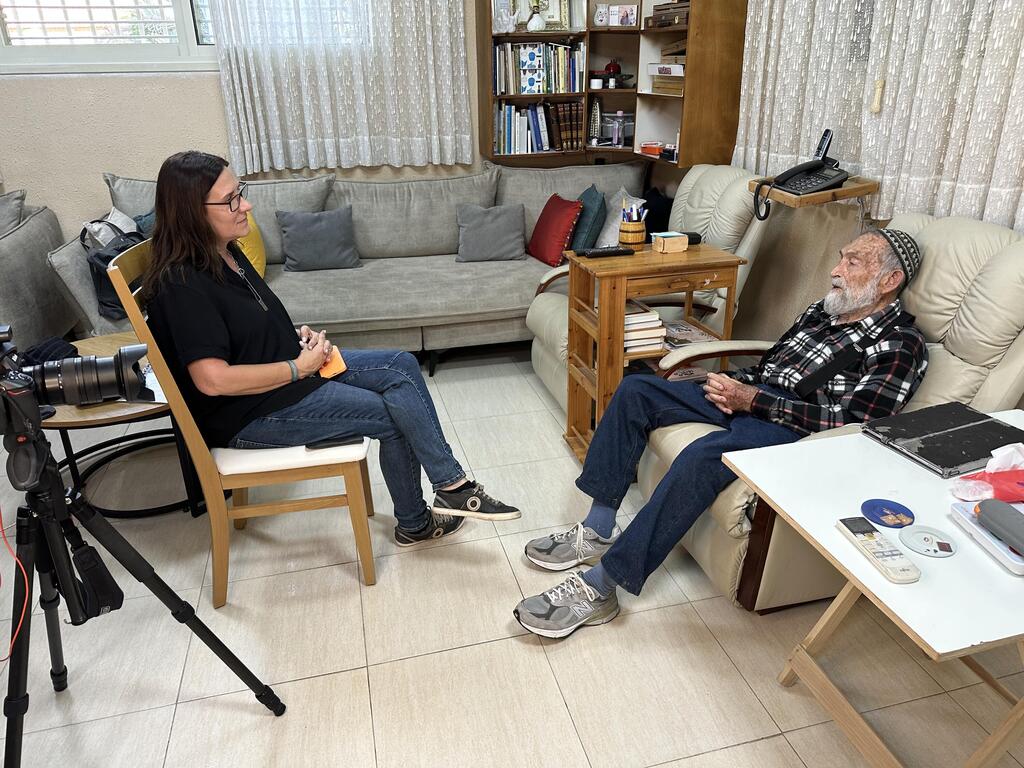Getting your Trinity Audio player ready...
"When I was released at the age of 10, I weighed only 33 lbs. I was more dead than alive," recalls Holocaust survivor Reuven Rosenblatt from Kfar Maimon, who survived the Bergen-Belsen concentration camp. Nearly 80 years later, when the warnings to enter shelters were issued during Simchat Torah on October 7, 2023, he was prepared.
"We went to the kitchen, took food and water. This, I think, is a result of my Holocaust experience: I always make sure to have reserves of everything at home... Toilet paper – you need reserves. Food – you need reserves. Always have something ready; you never know what awaits you. So, we were ready... We don’t have weapons at home, so I knew that if we needed weapons, we had five or six knives."
Rosenblatt is one of several Holocaust survivors from the Gaza border region who were filmed giving testimonies as part of the "Testimony 710" initiative. This civilian-led project collects accounts of the events of October 7, 2023, and is managed by volunteers. Over 1,500 testimonies have been gathered so far, with plans to publish them on the project’s website and on YouTube. To mark International Holocaust Remembrance Day on Monday, curated four-hour compilations of testimonies were screened at Tel Aviv Cinematheque.
Holocaust survivor Tzipora (Tzipa) Rubin from Nir Oz also shared her story. "I began my life in the Holocaust, and now, at the age of 80, another Holocaust has befallen us," she said. On October 7, she was hosting her husband Asher, who suffers from dementia, along with their daughter and granddaughter. Bentzi, the husband of her granddaughter Rotem, heard voices speaking Arabic from the shelter. After terrorists set fire to their house, the family had no choice but to escape through a window and hope for the best. They hid in the kibbutz for hours until they finally encountered an IDF soldier. "I tell my story freely, without even crying. I’ve cried a lot, but not when I tell the story. It’s as if it happened to someone else," Rubin shared.
Another survivor from the western Negev, Bella Haim, originally from Poland and a resident of Kibbutz Gvulot, shared her testimony. She is the grandmother of Yotam Haim, who was kidnapped to Gaza by terrorists and later mistakenly killed by IDF soldiers. A neighbor called her early on that fateful morning and informed her of the war. She immediately contacted her son Raviv, who lives in Sde Nitsan, and then her grandson Yotam in Kfar Aza.
"He sent me a message, and his voice now echoes around the world: 'Grandma, I’m a little stressed. There are terrorists in the kibbutz. I’m okay. Take care of yourself; it can happen anywhere,'" she recalled. "Around 9:45 a.m., I saw a message from him: 'They’re burning my house. I’m afraid I’ll suffocate.' My screams... where did they reach? I immediately thought of it as the second Holocaust. I didn’t wait for someone else to say it. I remembered the burning towns I had heard about in stories, and the terrible song 'The Town is Burning' came to mind in Yiddish, and I started singing it to myself."
After learning that her grandson Yotam had been kidnapped to Gaza, Bella held onto hope that he would return safely. On December 15, the devastating news arrived that he had been killed.
"On Thursday, I dreamed Yotam came back. We were sitting in a circle, and he went from one person to another with his smile and said, 'What, you were worried about me? Didn’t you think I’d come back? Here I am.' I woke up on Friday wondering what it meant – was it a farewell or perhaps a sign he was returning? I chose to believe he was coming back. That evening, I went to the dining hall, and everyone said to me, 'You look so beautiful today, what happened?' I said, 'I’m waiting for Yotam, for him to return.' In the middle of the meal, they took me aside to a friend’s house, and when I entered, I saw the social worker I knew. I said, 'Iris, you’ve come to tell me Yotam is coming back?' I saw her tears... my screams, I think, reached Gaza," she said, breaking into tears.
Holocaust survivor Dov Golombovich, one of the oldest residents of Kibbutz Nirim, recalled the morning of October 7. "There was a siren and I jumped straight from bed into the shelter. Usually, there’s a siren, you wait, and after another one, you go out. But this time, it didn’t stop; it was a flood," he said. "Then they announced: there’s an infiltration, close the shelter."
He spent hours "trapped in the sealed shelter," as he described it. "They told me the army would come, knock on the door, and call my name. Around the expected time, there was knocking, but no name was called, so I didn’t open," he said with a smile. "Suddenly, there were more knocks on the shelter door. They said, 'Dov, open up, we’ve come to get you out.' I asked them, 'How did you get in? It was locked...' They opened the window and came in through there."
Golombovich cautioned against comparing the Hamas attack to the Holocaust. "If we do that, we undermine the unique status of the Holocaust as a singular event. This was a terror attack," he said.
Get the Ynetnews app on your smartphone: Google Play: https://bit.ly/4eJ37pE | Apple App Store: https://bit.ly/3ZL7iNv
Francine Burstein, also from Nirim, took shelter that day with her husband, who suffers from dementia, and his Sri Lankan caregiver. "I was petrified. I told myself: Francine, you’re 85. This will be quick," she recalled. A Holocaust survivor from France, Burstein also rejected comparisons between the events: "You can’t say 'this is like the Holocaust.' You can’t compare six million people to this... It has similarities to the Holocaust, but we need a new word for it. 'Day of Destruction,' 'Point of No Return,' I don’t know what."
Daniel Luz from Kibbutz Be’eri, who survived the Holocaust in France, testified about his experiences. "On October 7, it was the first time I felt mortal fear – something I never felt in France," he described. During the terror attack, he was forced to stay in the shelter from 6:30 a.m. until midnight, when IDF soldiers rescued him.
Holocaust survivor Ruth Harn from Be’eri lost her son Avshalom, who was murdered in the attack on the kibbutz. Seven of her family members were kidnapped, and one remains in captivity — Tal Shoham, the husband of her granddaughter, Adi.
"I heard screams, footsteps, gunfire. I was surprised Avshalom didn’t come to check on me. I called him, but he didn’t answer. I stepped outside and saw the body of a neighbor lying on the ground," she said through tears. "I walked a few steps, and the third house from mine was empty, but the baby’s crib was soaked in blood."


